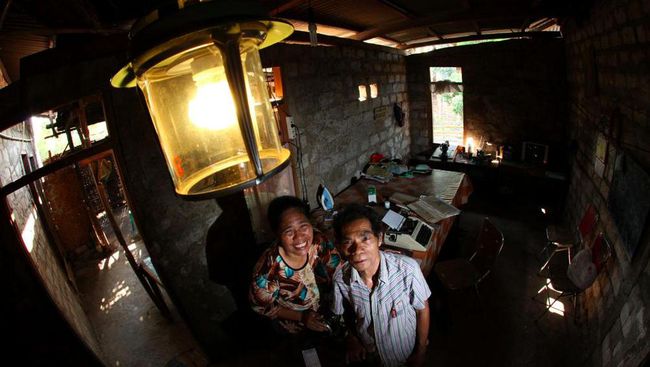
Community in Waingapu, East Sumba, East Nusa Tenggara, have utilised biogas produced by manures for lighting their houses. (photo: Yayasan Rumah Energi, file)
Jakarta, CNN Indonesia – As of February 3, 2015, as many as 70 thousand households in Indonesia have utilised energy produced by manures. Those entire households are the beneficiaries of domestic biogas programme (BIRU) developed by the Director General of New, Renewable, and Conservation of Energy under the Ministry of Energy and Mineral Resources.
The Director General of New, Renewable, and Conservation of Energy, Rida Mulyana, stated that since the launch of BIRU programme in 2013, as many as 14,173 BIRU reactors have been constructed in nine provinces. The success of such programme has encouraged the Government to expand the coverage of the programme to 13 provinces this year.
“This programme has been targeted to see further expansion to a minimum of four provinces in 2015. Today more than 70 thousands households have enjoyed the benefits of BIRU project,” uttered Rida as excerpted in the web page of the Directorate General of New, Renewable, and Conservation of Energy, Friday (2/13).
BIRU is a Hivos programme managed by the Directorate General of New, Renewable, and Conservation of Energy together with Yayasan Rumah Energi (YRE) and SNV with the partnership framework. The base of BIRU technology relies on manures produced by cows, pigs, and poultries further processed to be converted into the source of energy.
As it is supported by the Embassy of Norway and Energising Development (EnDev) Programme, today BIRU programme has been implemented in nine provinces namely Lampung, West Java, Central Java, Yogyakarta, East Java, Bali, West Nusa Tenggara, and East Nusa Tenggara.
In addition to minimising the reliance on fossil fuel, the survey results launched I 2013 indicated that the use of domestic biogas are more ecologically friendly as it is able to minimise the exhaust gas. “The odor emitted by the manures have been minimised by 80 percents. Therefore, today there are no longer objections received from the neighbours,” uttered Abas (54) the resident of Tulungagung, East Java who has adopted Domestic Biogas energy.
The inception report of research organisation, Soil and More International which performed the feasibilit study with regard to the roles of bio-slurry or biogas sludge. The use of biogas supports the Climate Smart Agriculture programme in Indonesia and indicate the potentials of carbon reduction between 2-7 tons of e-CO2/ha annually (gen).
(Source: http://www.cnnindonesia.com/ekonomi/20150213163107-92-31977/70-ribu-orang-indonesia-memasak-dengan-kotoran-ternak/)


